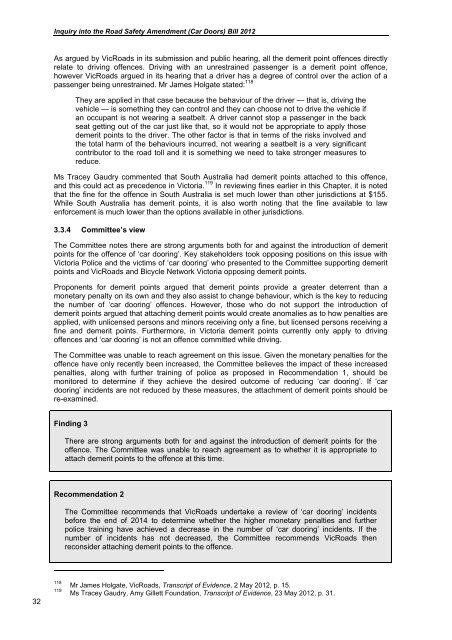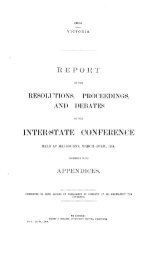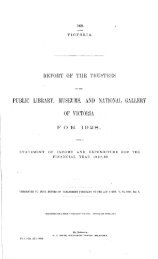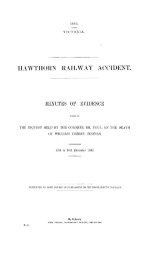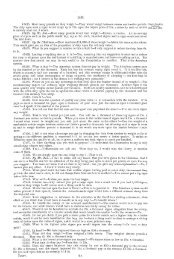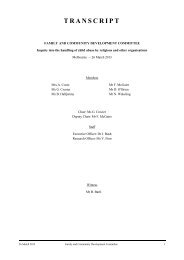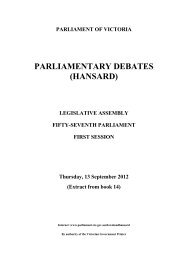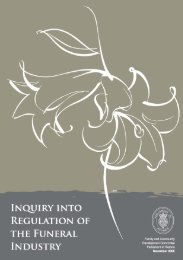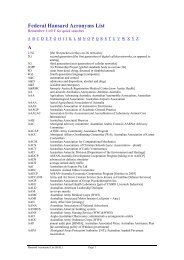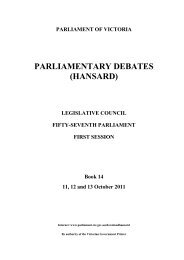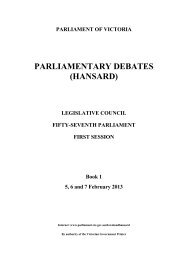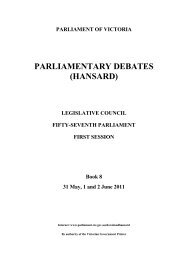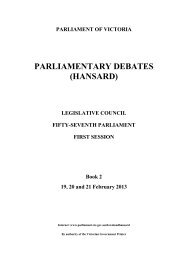Inquiry into the Road Safety Amendment (Car Doors) Bill 2012 Final ...
Inquiry into the Road Safety Amendment (Car Doors) Bill 2012 Final ...
Inquiry into the Road Safety Amendment (Car Doors) Bill 2012 Final ...
You also want an ePaper? Increase the reach of your titles
YUMPU automatically turns print PDFs into web optimized ePapers that Google loves.
32<br />
<strong>Inquiry</strong> <strong>into</strong> <strong>the</strong> <strong>Road</strong> <strong>Safety</strong> <strong>Amendment</strong> (<strong>Car</strong> <strong>Doors</strong>) <strong>Bill</strong> <strong>2012</strong><br />
As argued by Vic<strong>Road</strong>s in its submission and public hearing, all <strong>the</strong> demerit point offences directly<br />
relate to driving offences. Driving with an unrestrained passenger is a demerit point offence,<br />
however Vic<strong>Road</strong>s argued in its hearing that a driver has a degree of control over <strong>the</strong> action of a<br />
passenger being unrestrained. Mr James Holgate stated: 118<br />
They are applied in that case because <strong>the</strong> behaviour of <strong>the</strong> driver — that is, driving <strong>the</strong><br />
vehicle — is something <strong>the</strong>y can control and <strong>the</strong>y can choose not to drive <strong>the</strong> vehicle if<br />
an occupant is not wearing a seatbelt. A driver cannot stop a passenger in <strong>the</strong> back<br />
seat getting out of <strong>the</strong> car just like that, so it would not be appropriate to apply those<br />
demerit points to <strong>the</strong> driver. The o<strong>the</strong>r factor is that in terms of <strong>the</strong> risks involved and<br />
<strong>the</strong> total harm of <strong>the</strong> behaviours incurred, not wearing a seatbelt is a very significant<br />
contributor to <strong>the</strong> road toll and it is something we need to take stronger measures to<br />
reduce.<br />
Ms Tracey Gaudry commented that South Australia had demerit points attached to this offence,<br />
and this could act as precedence in Victoria. 119 In reviewing fines earlier in this Chapter, it is noted<br />
that <strong>the</strong> fine for <strong>the</strong> offence in South Australia is set much lower than o<strong>the</strong>r jurisdictions at $155.<br />
While South Australia has demerit points, it is also worth noting that <strong>the</strong> fine available to law<br />
enforcement is much lower than <strong>the</strong> options available in o<strong>the</strong>r jurisdictions.<br />
3.3.4 Committee’s view<br />
The Committee notes <strong>the</strong>re are strong arguments both for and against <strong>the</strong> introduction of demerit<br />
points for <strong>the</strong> offence of ‘car dooring’. Key stakeholders took opposing positions on this issue with<br />
Victoria Police and <strong>the</strong> victims of ‘car dooring’ who presented to <strong>the</strong> Committee supporting demerit<br />
points and Vic<strong>Road</strong>s and Bicycle Network Victoria opposing demerit points.<br />
Proponents for demerit points argued that demerit points provide a greater deterrent than a<br />
monetary penalty on its own and <strong>the</strong>y also assist to change behaviour, which is <strong>the</strong> key to reducing<br />
<strong>the</strong> number of ‘car dooring’ offences. However, those who do not support <strong>the</strong> introduction of<br />
demerit points argued that attaching demerit points would create anomalies as to how penalties are<br />
applied, with unlicensed persons and minors receiving only a fine, but licensed persons receiving a<br />
fine and demerit points. Fur<strong>the</strong>rmore, in Victoria demerit points currently only apply to driving<br />
offences and ‘car dooring’ is not an offence committed while driving.<br />
The Committee was unable to reach agreement on this issue. Given <strong>the</strong> monetary penalties for <strong>the</strong><br />
offence have only recently been increased, <strong>the</strong> Committee believes <strong>the</strong> impact of <strong>the</strong>se increased<br />
penalties, along with fur<strong>the</strong>r training of police as proposed in Recommendation 1, should be<br />
monitored to determine if <strong>the</strong>y achieve <strong>the</strong> desired outcome of reducing ‘car dooring’. If ‘car<br />
dooring’ incidents are not reduced by <strong>the</strong>se measures, <strong>the</strong> attachment of demerit points should be<br />
re-examined.<br />
Finding 3<br />
There are strong arguments both for and against <strong>the</strong> introduction of demerit points for <strong>the</strong><br />
offence. The Committee was unable to reach agreement as to whe<strong>the</strong>r it is appropriate to<br />
attach demerit points to <strong>the</strong> offence at this time.<br />
Recommendation 2<br />
The Committee recommends that Vic<strong>Road</strong>s undertake a review of ‘car dooring’ incidents<br />
before <strong>the</strong> end of 2014 to determine whe<strong>the</strong>r <strong>the</strong> higher monetary penalties and fur<strong>the</strong>r<br />
police training have achieved a decrease in <strong>the</strong> number of ‘car dooring’ incidents. If <strong>the</strong><br />
number of incidents has not decreased, <strong>the</strong> Committee recommends Vic<strong>Road</strong>s <strong>the</strong>n<br />
reconsider attaching demerit points to <strong>the</strong> offence.<br />
118 Mr James Holgate, Vic<strong>Road</strong>s, Transcript of Evidence, 2 May <strong>2012</strong>, p. 15.<br />
119 Ms Tracey Gaudry, Amy Gillett Foundation, Transcript of Evidence, 23 May <strong>2012</strong>, p. 31.


